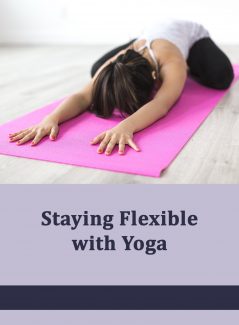
 License Type: Private Label Rights
License Type: Private Label Rights  File Type: ZIP
File Type: ZIP
 SKU: 63488
SKU: 63488  Shipping: Online Download
Shipping: Online Download
Sample Content Preview
Staying Flexible with Yoga
When people first start on their journey to practicing yoga, they are surprised by how many benefits they receive beyond their physical abilities. Yoga is a life philosophy and not just an exercise.
Throughout this guide, you will learn everything you need to know to get started on a fantastic journey to liberation with yoga. Yoga can help you achieve many things, from improved mental health to increased flexibility.
There is a myth that only the healthiest and most flexible can practice yoga. In fact, people who need it the most are the least flexible and shouldn’t let it stop them. Continue reading to see how easily you can get started today.
What Is Yoga?
Yoga is derived from the Sanskrit word “Yuji,” which means to bind. Yoga is considered a form of exercise as well as a discipline. Men and women have separate pronouns when practicing yoga. A male is called a yogi, and a female is called a yogini. Yoga has been seen in history since the 5th or 6th century BCE, and over time it has adapted.
About 2,000 years ago, a sage called Patanjali developed the eight limbs to yoga called Yoga Sutra. Each limb represents different things or stages of yoga practice.
Yamas – Restraints
Niyamas – Observances
Asana – Postures
Pranayama – Breathing
Pratyahara – Withdrawal of sense
Adharana – Concentration
Dhyani – Meditation
Samadhi – Absorption
As you practice each limb and grow in yoga, the goal is to reach liberation and enlightenment. Liberation is known as Savasana, and to get there, you must be at peace. Each session ends with the final pose of Savasana where you will lay down with your arms and legs out comfortably and breathe. Savasana represents calmness, relaxation, and letting go, surrendering yourself to peace and acceptance.
Yogis and yoginis today mostly focus on the limb asana. Asana focuses on different postures or poses that purify and provide strength and stamina to the body during meditation. Yoga is also a spiritual discipline, as it tries to connect the physical and mental body. However, you do not need to surrender any religious beliefs to practice; it is not a religion but rather a philosophy to live by.
As you can see, Yoga goes beyond the physical practice that most forms of exercise do. Yoga uses the mind, body, and breath to center and connect as one functioning unit to reach peace and liberation. Not only will your body become more flexible and healthier, but so will your mind.
The Many Benefits of Yoga
One of the reasons yoga is popular is due to the many different benefits it offers. The fantastic thing is that the benefits you receive are going to be unique to you and your experience. Yoga requires more from you than just executing a pose correctly. It is being in the moment and focusing on the pose that you are performing as well. It is an overall state of mind.
Read on to learn all the benefits you may experience after adopting a yoga routine:
Improved brain health – Yoga increases blood flow, which allows more oxygen to get to the brain to improve brain health. In turn, this will boost your memory and encourage your mind to focus more.
Improved heart health – Yoga can lower the risk of heart disease by improving blood circulation or even reducing high blood pressure.
Improved posture – The slow control and holds yoga requires stretches out the spine and effectively increases strength, which will encourage you to keep the correct posture.
Eased chronic pain – The movements promote blood flow and less inflammation, which relaxes the nervous system and releases tension that can be responsible for pain.
Immunity boost – Slow and controlled exercises increase blood flow, heart rate, and concentration to boost your immunity.
Improved mental health – Yoga involves being mindful and aware of your body as you perform each exercise. This helps boost self-esteem and acceptance of one's self. The stronger you get, the more rewarding your practice will feel.
Improved sleep – Any exercise and especially yoga will improve your sleep. If you are having trouble sleeping, add a routine to your mornings. Avoid exercising at night, however, as this will only increase your energy and make it harder to sleep. You will notice longer and deeper sleep.
Increased flexibility – By far one of the most important benefits you will receive from yoga is added flexibility. The wide range of movement holds and the concentration of the body allow for more flexibility. Flexibility is responsible for many health benefits that you will learn later on in this guide.
If you want to improve your health and increase your flexibility, then getting into yoga is exactly what you need to do. It is straightforward to get started and doesn’t take a lot of your time.
Common Yoga Questions and Answers for Beginners
Before you start practicing yoga, it is vital to understand the basics, what to expect, and where to start. Yoga takes a new outlook on exercising and life in general. It involves more than physically completing the exercise.
First, let’s go over a few common questions that new yogis, or yoginis, have that you may even be wondering yourself:
“Who is yoga best for?”
Yoga can be for just about anyone. This is because all poses can be modified or simply avoided if they are too difficult to perform. Depending on your abilities, it might be best to purchase more products to assist you, especially if you have problems with balance or flexibility. Over time your body will build more strength, and your balance and flexibility will improve.
“How long should I practice each day and how often?”
Again, the great thing about yoga is that it can be adjusted to your needs. When first starting with yoga, it is a good idea to start slowly. The recommended time is usually three times a week at 20 minutes a session. Don’t think you need to dive right in and overdo it right away. Even if you can put in five minutes a day, it’s enough.
“When Is the best time to practice yoga?”







